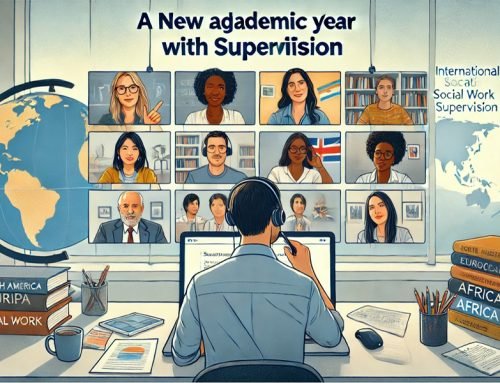Supervision as a Safe Haven: Lessons from Supervising Future Social Workers
After two years of collaboration with the International Social Work (ISW) program at HAN University, my role as a group supervisor comes to an end.
We met online in small groups with three or four students during their internships. Scattered across the globe, each doing their internship and working in very different corners of social work, they brought unique perspectives and challenges into our conversations.
For many of them, this was their first experience with group supervision. At first, some were doubtful, unsure what is was about. But as the sessions unfolded, most discovered how powerful structured reflection can be .Watching their growth was rewarding—and at times deeply moving.
Again I realized how different their world is from the one I stepped into as a young professional.
This generation carries the long shadow of COVID-19, with lasting effects on well-being. On top of that, they live in a time of poly-crisis—wars, climate change, and social instability weighing heavily. No wonder exhaustion is never far away.
What struck me most was how much they needed—yet often didn’t expect—the pause that supervision provides. A safe space to reflect, regain perspective, and reconnect with themselves. A chance to strengthen resilience, not only in their work but in their lives.
I integrated my neuroplastician brain–body insights and skills with my supervisory skills. Neuroplasticity is the ability of the brain to modify itself in response to learning and new experiences .
Students learned e.g. how stress works in the nervous system, why their energy is naturally limited, and how they can self-regulate and building capacity and resilience
These are no longer “nice to have” skills. They are essential. Not just for today’s students, but for all of us.
🔹 Supervision ≠ Managerial Control 🔹
Many students still confuse supervision with being managed. Understandably so: during internships, their “supervisor” is often a workplace manager who evaluates and directd their work.
But in higher education and professional practice, supervision means something very different. It is not about performance appraisal or oversight. Supervision is a reflective, developmental process: a safe space to examine real-life practice, make sense of experience, and grow a professional voice.
👉 Supervision is not about oversight, but about professional growth, ethical practice, and lifelong learning.
As a university-appointed supervisor, my role was to facilitate reflective dialogue—helping students process complex situations, strengthen ethical practice, and connect theory with the realities of the field.
It is encouraging that HAN University has made supervision a structural part of the curriculum. Yet, many social work organizations still fail to embed it in their strategies—despite its vital role.
The scale alone underlines the urgency: in the Netherlands, 53,000 students study social work at 20 universities of applied sciences, and about 9,000 graduate each year. These professionals need supervision not only during their studies, but throughout their entire careers.
And the need for supervision extends far beyond social work and students.
Health care professionals such as nurses, therapists, specialists in hospitals, behavioral trainers and coaches , they can all strengthen their professional capacity supervision as a way of continuous professional learning and for (re)certification of their main profession .
“Supervision is not a luxury—it is an essential foundation for sustainable practice, resilience, and quality of care“.
🔹 What HAN students said About Supervision
- “It was refreshing to be in a group of peers I hadn’t worked with before.”
- “It broadened my horizon and gave me insight into new ways of approaching situations in my own context—sometimes more effectively.”
- “I gained different perspectives by learning about models and integrating theory with practice. That helped me make sense of problematic situations I encountered.”
- “It helped me reflect on a meta-level.”
- “It was a safe space for learning. I wasn’t afraid to speak up or make mistakes. It felt like a safe haven amid the stress of my internship.”
- “It helped me develop a more critical eye toward my own behavior and reactions. That awareness made a big difference.”
- “The small group format worked really well. A larger group wouldn’t have allowed for the same level of trust and depth.”
- “Others were able to see what I couldn’t. They confronted me with my blind spots while also supporting my development.”
- “Through supervision, I began to appreciate my strengths and found it easier to face challenges.”
- “I discovered barriers rooted in long-standing behavior patterns.”
- “Supervision helped me understand how my values, norms, and behavior patterns—consciously and unconsciously—affect my presence and interactions at work.”
- “I’ve felt growth in my openness and my comfort with vulnerability.”
As my contract with HAN has now come to an end, I move forward with growing insights from working with this new generation of young professionals.
🔹 Interested in Supervision in your professional field? 🔹
💬 How is supervision organized in your field? Do practitioners receive the reflective support they need?
Let’s connect You can directly schedule a zoom call with me 👉 here
#Supervision, #Neuroplastician, #ProfessionalDevelopment, #ReflectivePractice, #Leadership, #Coaching






